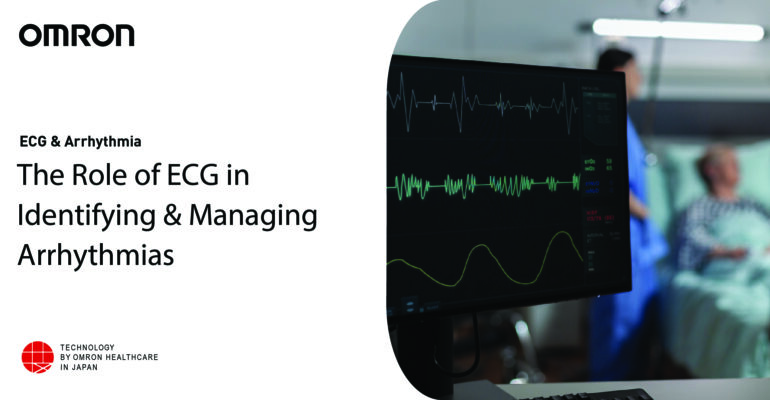The Role of ECG in Identifying and Managing Arrhythmias
June 26, 2023 2023-12-23 21:20The Role of ECG in Identifying and Managing Arrhythmias

The Role of ECG in Identifying and Managing Arrhythmias
Electrocardiogram (ECG) is a test that records the heart’s electrical activity. It is a painless and non-invasive test that can be used to diagnose various heart conditions, including arrhythmias. In this blog, we will delve into the role of ECG in identifying and managing arrhythmias, highlighting its significance in cardiovascular healthcare.
What is ECG?
A electrocardiogram, commonly known as an ECG or EKG, is a diagnostic test that records the heart’s electrical activity. It involves attaching electrodes to the skin, typically on the chest, limbs, and sometimes the abdomen. These electrodes detect the heart’s electrical signals, which are then displayed as waveforms on a graph or monitor. The resulting ECG tracing provides valuable information about the heart’s rhythm, rate, and any abnormalities that may be present. This non-invasive test provides valuable insights into the heart’s electrical activity, enabling healthcare professionals to diagnose specific arrhythmias and develop appropriate treatment plans.[1]
What are Arrhythmias?
Arrhythmias are abnormal heart rhythms. They can be caused by a number of factors, including heart disease, electrolyte imbalances, and medications. Arrhythmias can be mild or severe, and they can range from being asymptomatic to life-threatening. [2]
There are many different types of arrhythmias.
Some of the most common types include:
- Atrial fibrillation: This is a common arrhythmia characterized by an irregular and fast heartbeat.
- Tachycardia: This is a fast heartbeat that is caused by an increased heart rate.
- Bradycardia: This is a slow heartbeat that can be caused by a number of factors, including heart disease and medications.
Why should you use ECG?
To identify Arrhythmias:
- Sinus Rhythm Assessment: The ECG helps determine the normal sinus rhythm, which represents the regular electrical activity of the heart. By analyzing the P waves, QRS complexes, and T waves on the ECG, healthcare professionals can assess the heart’s rhythm and rule out any immediate arrhythmia concerns.
- Detecting Specific Arrhythmias: ECG plays a crucial role in identifying specific arrhythmias, such as atrial fibrillation, ventricular tachycardia, or supraventricular tachycardia. By analyzing the ECG waveform patterns, including the duration, shape, and intervals, healthcare professionals can accurately diagnose the type of arrhythmia and determine the most appropriate treatment approach.
- Monitoring for Silent Arrhythmias: ECG monitoring, including ambulatory ECG monitoring (Holter monitoring) or event recorders, allows for detecting intermittent or silent arrhythmias. These devices record the heart’s electrical activity over an extended period, capturing any irregularities that may not be evident during a brief in-office ECG. Such monitoring is particularly useful in identifying arrhythmias that occur infrequently or sporadically. [3]
To Managing Arrhythmias:
- Treatment Planning: Once an arrhythmia is identified through the ECG, healthcare professionals can develop a tailored treatment plan. The ECG helps determine the severity of the arrhythmia, guides the choice of medications, or indicates the need for interventions such as cardioversion, catheter ablation, or implantable devices like pacemakers.
- Assessing Treatment Effectiveness: ECGs are vital in assessing the effectiveness of arrhythmia treatment over time. Regular follow-up ECGs allow healthcare professionals to monitor the heart’s response to medication adjustments or interventions and make necessary modifications to optimize treatment outcomes.
- Long-Term Monitoring: For individuals with chronic or recurring arrhythmias, periodic ECG monitoring is essential for long-term management. Routine ECG assessments help identify changes in the heart’s electrical activity, allowing healthcare professionals to adjust medications, monitor disease progression, and detect potential complications. [4]
What are some benefits of using ECG to identify and manage arrhythmias?
- ECG is a non-invasive and painless test: This means that it does not require any needles or surgery, and it is not painful. This makes it a good option for people who fear needles or have a low pain tolerance.
- ECG is a quick and easy test: It typically takes only a few minutes to complete, and there is no need to fast or prepare for the test in any way. This makes it a convenient option for busy people or having difficulty scheduling appointments.
- ECG is a reliable test that can be used to diagnose a variety of arrhythmias: The test can show the heart rate, the rhythm of the heartbeat, and the size and shape of the heart’s electrical waves. This information can help doctors diagnose arrhythmias and determine the best course of treatment. [5]
ECG can be used to monitor arrhythmias and track any changes in the heart rhythm: This is especially important for people with a history of arrhythmias or at risk of developing arrhythmias. By monitoring arrhythmias, doctors can identify changes in the heart rhythm and take steps to prevent complications.
Omron Complete exemplifies integrating advanced technology and healthcare, offering individuals a reliable and accessible tool to identify and manage arrhythmias. With its ease of use, accuracy, and ability to provide critical data for both patients and healthcare professionals
Conclusion:
If you have any concerns about your heart health, it is important to talk to your doctor. Your doctor may recommend an ECG to help diagnose any underlying heart conditions.
The ECG plays a vital role in enhancing the quality of cardiovascular healthcare, helping individuals with arrhythmias receive appropriate interventions and ongoing management for a healthier heart rhythm.
Reference:
- https://www.nhs.uk/conditions/electrocardiogram/#:~:text=An%20electrocardiogram%20(ECG)%20is%20a,heart%20each%20time%20it%20beats.n
- https://www.mayoclinic.org/diseases-conditions/heart-arrhythmia/symptoms-causes/syc-20350668
- https://www.sciencedirect.com/science/article/pii/S1877705812020772
- https://pubmed.ncbi.nlm.nih.gov/21097000/
- https://www.mayoclinic.org/tests-procedures/ekg/about/pac-20384983






